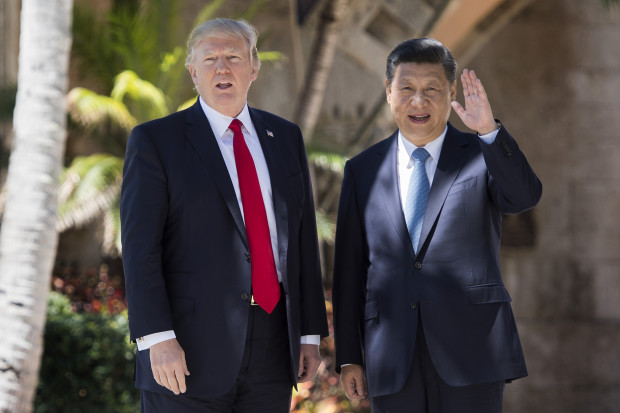
Chinese President Xi Jinping (R) waves to the press as he walks with US President Donald Trump at the Mar-a-Lago estate in West Palm Beach, Florida, April 7, 2017. AFP
US President Donald Trump ditched his trademark anti-China bombast, hailing an “outstanding” relationship with counterpart Xi Jinping at the end of a superpower summit Friday overshadowed by events in Syria.
“We have made tremendous progress in our relationship with China,” Trump said effusively at the close of a high-stakes but studiously familiar first meeting between the pair at his Mar-a-Lago resort in Florida.
“I think truly progress has been made,” Trump said, declaring his relationship with Xi as “outstanding.”
The friendly tone was a far cry from Trump’s acerbic campaign denouncements about China’s “rape” of the US economy and his vow to punish Beijing with punitive tariffs.
Xi reciprocated Trump’s warm words, saying the summit had “uniquely important significance” and thanking Trump for a warm reception.
Beijing’s most powerful leader in decades reciprocated, inviting the neophyte president on a coveted state visit to China later in the year. Trump accepted, with a date yet to be determined.
We “arrived at many common understandings,” Xi added “the most important being deepening our friendship and building a kind of trust.”
The bonhomie extended behind closed doors, where the US president’s grandson and granddaughter sang a traditional Chinese ballad — “Jasmine Flower” — and recited poetry for their honored guests, according to Chinese state media.
“Both the atmosphere and the chemistry between the two leaders was positive, the posture between the two really set the tone,” said Secretary of State Rex Tillerson.
“All of us are feeling very good about the results of this summit.”
Winter White House
The start of the meeting came on a night of high drama as Trump not only met his nearest peer in economic world power for the first time but also launched his first military strike on a state target.
Trump informed the Chinese leader personally of the strike as the 59 Tomahawk missiles were winding their way to the Shayrat airbase.
Although China is not implicated in the Syrian war, Trump’s actions resonate widely, not least in the debate over how to tackle North Korea’s nuclear and ballistic missile programs.
China and the United States agree Pyongyang’s programs are a serious problem, but have not seen eye-to-eye on how to respond.
“There is a real commitment to work together to see if this cannot be resolved in a peaceful way,” said Tillerson.
Trump asked Xi for ideas on how to proceed, but held out the possibility of unilateral action.
“(We) are prepared to chart our own course if this is something China is just unable to coordinate with us,” said Tillerson.
Deliverables
There appeared to be little in the way of concrete achievements during 24 hours in the sun, but officials said that a rapport had been built that will carry on the next four years.
The US leader appeared confident when Xi arrived at the Florida venue, even hazarding a joke about his own reputation as a dealmaker.
“We had a long discussion already. So far, I have gotten nothing. Absolutely nothing,” he said to laughs from the delegation.
“But I can see that, I think long-term, we are going to have a very, very great relationship and I look very much forward to it.”
The two leaders were joined Thursday evening by US First Lady Melania Trump, a former model, and Peng Liyuan — a celebrated folk singer Trump hailed as a “great, great celebrity.”
There was little evidence of Xi’s promised “tweetable deliverables” designed to smooth ties, but they may be rolled out during a 100-day plan on trade.
Sources briefed on Xi’s plans promised a package of Chinese investments aimed at creating more than 700,000 American jobs — the same number China’s regional rival Japan pledged to Trump during Prime Minister Shinzo Abe’s Mar-a-Lago visit in February.
In return, Xi hoped to obtain assurances from Trump on punitive tariffs and the delay of an American arms sale to Taiwan, at least until after a major Communist Party meeting later this year.
Trump’s position on democratically ruled Taiwan — which China considers a breakaway province — has been a major irritant since he accepted a protocol-breaking phone call from the Taiwanese president after his election victory.